Oh, excuse me, I was just busy pouring some salt all over my fries… if this sounds familiar to you, you’re certainly not alone!
Salt, readers, seems to magically make most foods better. Popcorn bland? Try salt. Your pasta sauce needs a little spice? Get that salt shaker out. There are so many things salt improves that I don’t even have time to list them all.
However, salt is not something you should have too much of. As noted by Harvard Medical School, too much sodium can cause high blood pressure in people (https://www.health.harvard.edu/staying-healthy/the-trouble-with-excess-salt). Despite the fact that you probably already knew that, I bet you’re still tempted to add it to your food whenever you have the chance. That’s because there is actually an element of addiction to salt for some people. A study by the University of Melbourne in Australia and Duke University researchers found that addictive drugs activated the same connections in the brain and nerve cells that are associated with an appetite for salt (https://www.sciencedaily.com/releases/2011/07/110711151451.htm).
However, unlike addictive drugs, you do need some of the sodium found in salt to live. Sodium is what helps your body regulate water balance and control and nerve and muscle functions. Of course, some people are definitely sensitive to sodium and experience fluid retention and higher blood pressure when they have a little too much. People who are less sensitive to salt appear to handle dietary sodium without any additional issues popping up.
Even if you’re not addicted to salt, cravings for it are common, and many people take in more than the daily recommendation of 1,500 mg of sodium. Prepacked, prepared and processed foods are believed to be among the primary contributors of sodium to the Western diet, along with prepared meals from restaurants.
To cut down on your sodium, gradually eat fewer processed foods and replace them with fresh vegetables, fruits and meats you make at home. Sodium content is higher in processed foods because it acts as a preservative and a flavor enhancer. You can also skip foods where you can clearly see the salt, such as chips, take your salt shaker off of your table, and check your go-to condiments, which might be packed with sodium. Many sauces, soups and condiments have low or no-sodium options available that you can use to replace the most serious salt offenders in your pantry.




